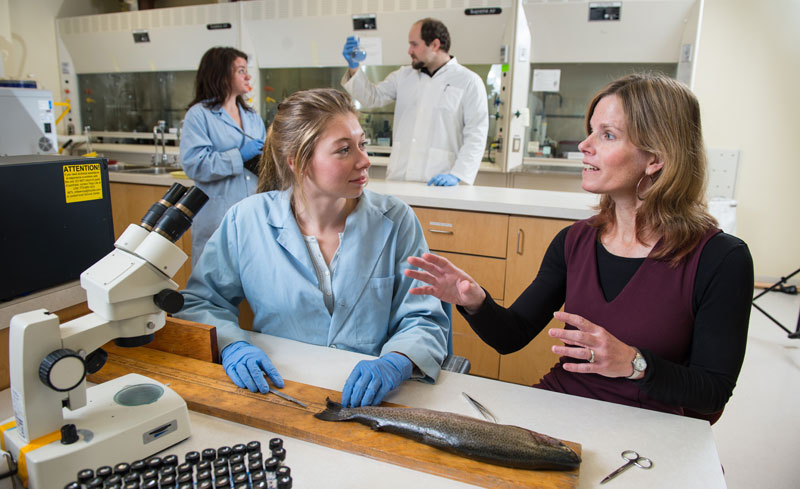New Brunswick scientists build national river science powerhouse
Author: Communications
Posted on Sep 22, 2016
Category: UNB Saint John , UNB Fredericton

Researchers based at the University of New Brunswick (UNB) are playing lead roles within the internationally acclaimed Canadian Rivers Institute (CRI), which, in the lead up to World Rivers Day on Sept. 25, is releasing a report today highlighting its first 15 years of achievements.
Founded in 2001 by four visionary aquatic scientists at UNB, the CRI has grown into a network of 22 science directors and their multi-disciplinary research teams based at 14 universities and institutions across Canada and abroad. The Institute is a “made in New Brunswick” success story, having put scientific expertise and technology germinated at UNB on the international stage. In a short time, the CRI has evolved into a world leader in applied aquatic science that is addressing many challenges facing the world’s rivers and estuaries.
“We are very proud of what we have built here in New Brunswick. We have attracted top researchers and students from all over the world and almost $50 million in investments in ground-breaking science and state-of-the art laboratory facilities,” says Dr. Karen Kidd, a CRI science director, tier 1 Canada Research Chair and professor of biology at UNB. “This investment has had many returns for the health of rivers both within and outside of the province.”
“In just 15 years, the Canadian Rivers Institute has made a name for itself around the globe. Such a mighty accomplishment stands as a testament to the remarkable work and dedication of its people,” says Eddy Campbell, president and vice-chancellor at UNB. “Canadian Rivers Institute scientists are pioneers in every sense of the word.”
Institute director Michael van den Heuvel says the CRI is breaking new ground in applied science across disciplines to find answers to the important questions being asked today about the world’s rivers. “Whether it is a government seeking to develop regulations, or an industry looking to develop better management processes, every one of our projects is finding a solution to a vital question that affects people and wildlife,” says Dr. van den Heuvel, who is a professor of biology and past Canada Research Chair in Watershed Ecological Integrity at the University of Prince Edward Island.
Founded by Drs. Rick Cunjak, Allen Curry, Deborah MacLatchy and Kelly Munkittrick, CRI now includes eight UNB science directors working on key freshwater issues such as:
- How to plan for replacement or removal of aging hydro-electric dams – of which tens of thousands exist worldwide;
- How Arctic freshwater ecosystems are responding to climate change;
- How to recover at-risk fish populations such as wild Atlantic salmon; and
- How to better assess the effects of multiple human activities on watersheds and the people and wildlife that depend on them.
“The CRI’s Mactaquac Aquatic Ecosystem Study (MAES) is the first comprehensive study of a large dam renewal or removal project,” says Dr. Allen Curry, a CRI science director, professor, department of biology, UNB, and principal investigator of MAES. “This puts the CRI on the leading edge of what will be a trillion-dollar industry that will be necessary to deal with the more than 100,000 aging dams worldwide with pending renewal and removal questions.”
Student training and professional development is at the centre of the CRI’s work. It has mentored more than 450 students in disciplines that include biology, chemical engineering, civil engineering, environmental management, geology, and policy. Twenty per cent of these students have come from around the world. Two thirds of CRI students studied at UNB. Forty per cent of New Brunswick alumni have stayed to continue their education or work.
To further student support, CRI science directors have secured a Natural Sciences and Engineering Research Council (NSERC) grant that provides more than $1 million to students for unique training and professional development courses on water science and management. More than half of the students taking advantage of this program are based at UNB.
The CRI’s plans for the next 15 years include:
- Addressing the pressing issue of dam renewals by transferring expertise and knowledge to systems around the globe;
- Ensuring the protection and conservation of wild Atlantic salmon;
- Continued global leadership in biodiversity research and monitoring in the circumpolar Arctic;
- State-of-the-art training of at least 1,500 more aquatic science experts to meet growing global demands for water professionals;
- Developing further cutting-edge biomonitoring tools and incorporating them into assessments of river health.
Media contact: Stephanie Merrill, Communications Officer, (o) 506-453-4770, (m) 506-261-8317
- High-res photo for use by media
